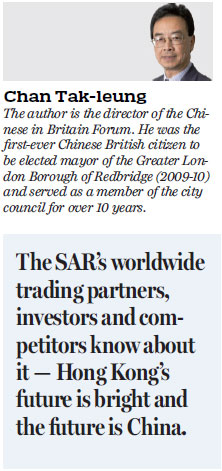Greater Bay Area prospects assure bright future for HK
Updated: 2017-10-13 07:49
(HK Edition)
|
|||||||||
Chan Tak-leung notes the CE's focus on city's role within China as well as its innovation and technology development
During her recent visit to London as chief executive, Carrie Lam Cheng Yuet-ngor signed a FinTech Bridge Agreement with Britain aiming to promote government-to-government, regulator-to-regulator and industry-to-industry cooperation in financial technology. The rest of the visit was more or less devoted to meeting key players in the fields of arts and design, education, fintech, medical technology, online investment management, asset management as well as green finance.
In most if not all the speeches she made during the visit, the CE placed her emphasis on Hong Kong's position as the largest global offshore renminbi center, opportunities created by the Belt and Road Initiative and the enormous opportunities which will result from creation of the Greater Bay Area involving nine cities in Guangdong province alongside the Hong Kong and Macao special administrative regions.
The project will undoubtedly become Asia's, if not the world's, largest technology region, challenging the San Francisco Bay Area - commonly known as Silicon Valley - as the world-class cluster for technology and business of the future. It will also bring win-win situations for all stakeholders involved and as far as Hong Kong is concerned, the proposed development will help inject further impetus into the city, enriching its current status as a global financial and trading center with the added bonus of improved research and development, innovation and technology added to its current list of specialist skills on offer - along with the enormous potential of access to the Chinese mainland market.

However, one must also remember Hong Kong is not and will not be the sole contributor to the establishment and success of the Greater Bay Area without mainland partners. Just imagine the human resources, technology, investment, research, development and production capacities that all the cities in Guangdong province will bring forth. Increasing demand for technological innovation in the mainland, Asia and the world markets will make Hong Kong a global player but the city alone cannot and will not achieve its potential without enhancing links with mainland partners.
Soon after her return from London, Lam has again confirmed publicly that innovation and technology will be her administration's "priority area". Without a doubt, this sector will drive Hong Kong's economic growth in the short and medium term while it will also generate long-term benefits for the SAR's citizens as a whole. Opportunities for cooperation in the Greater Bay Area, therefore, must be seized for all concerned, including the SAR's elected legislators, political activists of all persuasions, university students, lecturers, employers, employees and businesses alike.
Political wrangling, to say the least, is neither helpful nor conducive in promoting a positive environment for the SAR's young talents who should concentrate on supporting a vibrant, innovative and sustainable Hong Kong instead of dogmatically arguing for independence. As an SAR of China under the "one country, two systems" principle, the SAR's citizens should recognize that the Basic Law is there to govern the rights of the SAR and China as a whole.
These rights must therefore be adhered to at all times and should not be breached. While Hong Kong citizens are entitled to a high degree of autonomy, with their rights and freedoms safeguarded and the socialist system and socialist policies not being practiced in the SAR on the one hand, the SAR is also an alienable part of China; national unity and territorial integrity must be upheld.
There is no third way to breach the parameters of the SAR's governance.
One can look back in history and learn from other nations' bitter experience. Britain, for example, was literally torn apart by the two main political parties in the late 1970s and early 1980s with opposing ideologies on privatization, workers' rights and how best to deal with unemployment and inflation.
With the SAR's present economic opportunities, the most crucial task is to take positive steps in engaging its young and talented people to participate in realization of the Greater Bay Area project. The SAR government is a key player in making the project a success. To begin with, authorities should invest more in research and development, as well as encourage local businesses to do the same. At the moment the government invests only 0.73 percent in research and development. Although the CE promised in the Policy Address to raise the percentage to 1.5, it is still way below neighboring economies such as Shenzhen at 4 percent, Singapore's 2 percent, South Korea's 4 percent, Taiwan's 3 percent and Beijing's 6 percent.
The SAR's citizens must also fully understand that Hong Kong's economic future will be closely intertwined with that of the mainland - ranging from imports and exports to bilateral investments and stock markets to land sales. Different policies, schemes and initiatives - such as the Closer Economic Partnership Arrangement (CEPA), individual visit scheme, stock connects with Shanghai and Shenzhen, mutual recognition of funds and so on are realities which demonstrate closer links and cooperation with the mainland are not only necessary but a reality.
The SAR's worldwide trading partners, investors and competitors know about it - Hong Kong's future is bright and the future is China.
(HK Edition 10/13/2017 page1)